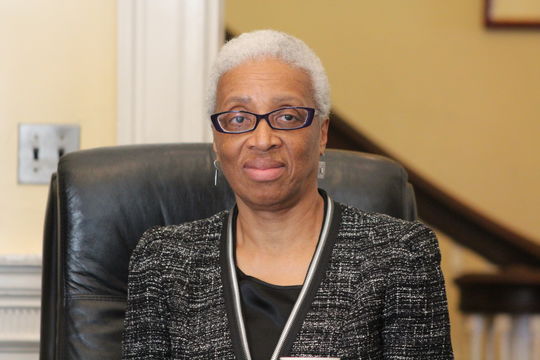Geraldine S. Hines, an associate justice of the Massachusetts Supreme Judicial Court, will be the Spring 2018 Jerome Lyle Rappaport Distinguished Visiting Professor. She will teach the seminar “Advanced Topics in Criminal Procedure: Race and Policing,” as well as participate in lectures and panel discussions.
Hines (who will also address the Class of 2017 at Boston College Law School’s 85th Commencement on May 26) follows former US Attorney Carmen Ortiz, who was recently named the Rappaport Distinguished Visiting Professor for the Fall 2017 semester.
“This endowed visiting professorship allows us to bring thoughtful government leaders to the Law School for a semester or more to interact with our students and faculty around current public policy problems, and to teach a course within their unique area of expertise,” said BC Law Dean Vincent Rougeau in an earlier statement. “The Rappaport Distinguished Visiting Professorship has really enriched our curriculum and our community.”
“I am honored to have this opportunity to teach and to learn from extraordinary Boston College law students who are destined to make a difference in the many broken places in our society,” Justice Hines said, when asked about her appointment.
Justice Hines grew up in the segregated South, a young witness to the 1960s upheavals over the struggle to dismantle the “Jim Crow” laws and customs that defined life for black people during that period in our history. Her appointment to the SJC by Governor Deval Patrick in 2014—a first for a black woman in the 322 years since the establishment of the court—capped four decades of service to the causes she championed based on her experiences as a child of the Mississippi Delta.
As she told Gargoyle, the alumni publication of the University of Wisconsin, where she received her law degree, “I chose work that was important to me,” work that allowed her to “join like-minded people determined to change the status quo.”
Justice Hines jumped right in after graduation from law school, becoming a staff attorney at the Massachusetts Law Reform Institute where she litigated prisoner rights cases. She later applied her research into police misconduct as an MIT fellow when serving as co-counsel in Commonwealth v. Willie Sanders, a highly publicized trial of a black man accused of raping eight women. As a staff attorney at the Harvard University Center for Law and Education, she litigated civil rights cases relating to discrimination in education and advised on special education law.
As a founding partner in the first law firm of women of color in New England, she litigated cases on discrimination in education, labor and family law matters, employment discrimination, and police misconduct claims. “Our little firm took cases that most big law firms wouldn’t touch,” she told Gargoyle. “We tried to represent folks who had legitimate justice concerns, whether or not they had the means to pay for our services.”
She began her judicial career in 2001 as an associate justice of the Superior Court, and was appointed to the Appeals Court by Governor Patrick in 2013 before her appointment to the SJC a year later.
Among the more prominent organizations in which Justice Hines has been involved are the American Civil Liberties Union, the National Lawyers Guild, and the National Conference of Black Lawyers. She was a founding member of Lawyers Against Apartheid in Boston and was active in the Massachusetts Citizens Against the Death Penalty before her appointment to the bench. Out of her concern for human rights in the international arena, she was an election observer in Eritrea and in the first all-race election in South Africa and, she participated as a member of a delegation of lawyers investigating human rights abuses in the Middle East.
“I am delighted that Justice Hines has agreed to join us for a semester at Boston College Law School upon her retirement from the Court,” said BC Law Professor and Rappaport Faculty Director R. Michael Cassidy. “Given her extensive judicial experience and her success as a prominent civil rights attorney before taking the bench, Justice Hines will be a phenomenal teacher, mentor, and role model to our students. Justice Hines has litigated high profile civil rights cases in the fields of education, employment law, and criminal defense. More importantly, she has pursued a career of meaning, purpose, and service, the aspiration we hold for all of our graduates.”


